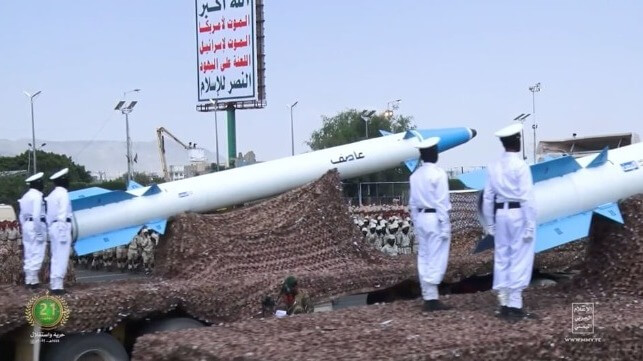Tanker Damaged by Houthi Missile Strike in Red Sea

On Monday evening, shortly after two maritime security consultancies reported a new attack on a merchant ship in the Red Sea, U.S. Central Command confirmed that a tanker has been hit by a cruise missile launched from Yemen.
The vessel has been identifed as the Norwegian-owned tanker Strinda. At the time of the strike, the ship was about 60 nm to the north of Bab el-Mandeb, an American official told ABC.
A fire and damage were reported, but no injuries, CENTCOM said. The destroyer USS Mason has diverted to the scene to assist the tanker.
Central Command assesses that Strinda was hit by a Yemeni anti-ship cruise missile. Yemen's Houthi forces control the area in question, and are primarily supplied by Iran. The group is known to be in possession of multiple types of anti-ship missiles, primarily Iranian-built models.
It is not the first time that Houthi rebel forces have attacked shipping in the Red Sea. The group has repeatedly used drones and missiles to strike at ships it says are linked to Israel. Recent attacks include a ballistic missile launch aimed in the vicinity of the tanker Central Park on November 26. The group is also holding an Israeli-linked car carrier hostage near the port of Al Salif.
Houthi leaders have pledged to attack all Israel-bound merchant shipping in retaliation for the ongoing Israeli operation against terrorist group Hamas in Gaza. The Strinda has no obvious ties to Israel: it is Norwegian-flagged, owned and operated, and its ISM manager is based in Singapore. Its AIS record does not show any calls in Israeli ports within the last year.

that matters most
Get the latest maritime news delivered to your inbox daily.
The Israeli government has threatened to take action to stop Houthi attacks on shipping if others do not step in first. The White House has been working to build a coalition to maintain maritime security in the region, based on the existing Combined Maritime Forces (CMF) coalition, but has so far declined to take unilateral action against Houthi forces on the ground.
“Israel is giving the world some time to organize in order to prevent this but if there isn’t to be a global arrangement, because it is a global issue, we will act in order to remove this naval siege,” said Israeli National Security Adviser Tzachi Hanegbi, speaking to local media on Saturday.
